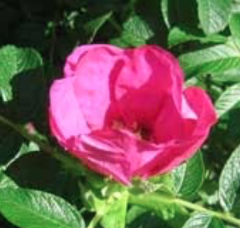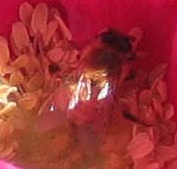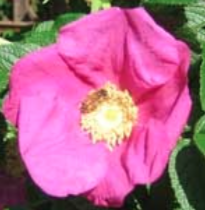
Sharing roses with bees
by Arjuna da Silva
 I walked out to the farm at 7:30 to collect the petals, even though the instructions said to wait till the dew had evaporated. But Andy needed some ice for a few hours’ storage of the day’s harvest, and I figured it would only take another half hour for the sun to capture the dew. Once there, I saw that there was no way the sun’s rays of light or heat were going to reach those roses so soon. I would have to give them at least another hour.
I walked out to the farm at 7:30 to collect the petals, even though the instructions said to wait till the dew had evaporated. But Andy needed some ice for a few hours’ storage of the day’s harvest, and I figured it would only take another half hour for the sun to capture the dew. Once there, I saw that there was no way the sun’s rays of light or heat were going to reach those roses so soon. I would have to give them at least another hour.
An hour later, of course, I’m in the thick of a focused conversation with a young neighbor who is probably in need of more support for the enormous project he’s taken on than he realizes. (Aren’t we all?!) Then there are two intense phone calls, one after the other — the first from a friend whose husband is almost ready to discard his cancer-wracked body, the second from a neighbor I’ve been trying to get together with for weeks.
 The roses! The roses! my thoughts chirp at me in between concentration on the words I’m hearing and saying.
The roses! The roses! my thoughts chirp at me in between concentration on the words I’m hearing and saying.
Though it’s almost ten-thirty by the time I get back to the roses, I’m relieved to find it’s still not too hot at the farm. The roses are intensely more fragrant than they were shortly after sunrise! I start at the northeast corner and navigate the rugosas climbing along the fence, looking for the dropped petals that show me which blossoms are ready to focus on their hips and have their petals fully removed.
While gathering petals into my basket, I notice chubby black-and-yellow bees buzzing and hopping from flower to flower, doing their bobbing bee-dance among the pollen-rich pistils and seeming to be especially drawn to the darker pink blooms. Occasionally, my fingers brush their furry backs as I reach over the stems they’ve chosen to reach the ones calling to my harvest-lust. They are totally undisturbed by me, and suddenly I’m aware that we are companions in the same field, doing our modest parts among the fruits of abundance, each participating in the gifts of the rose in our own way. The sun is our companion, too, as are the whistlers and peepers in nature’s symphony that carry on all around us.
 Working harmoniously at our own paces, we enjoy the blessings of non-competition: I’m not interested in their pollen, and they don’t seem to need the falling petals.
Working harmoniously at our own paces, we enjoy the blessings of non-competition: I’m not interested in their pollen, and they don’t seem to need the falling petals.
My intention, not nearly as grand as theirs, is to learn to make rosewater, and then rose oil. A quick Internet search told me there are nutrients in roses which, when applied to the skin or used internally in the right way, have powerful if subtle affects that are not just aromatic. I remember that decades ago I drank rose wine with a friend who got it from her landlady, who made it from the roses that grew in their street garden on a city block in San Franciso. It was delicate and deliciously fragrant.
Today I’ve chosen the simplest of rosewater recipes, seeking to understand the basics of rose processing before I think about how to embellish them. My harvest fills half my largest heat-loving bowl with fresh blossoms that press down to a cup’s worth, and then I pour two cups of boiled springwater over them, teasing the petals under the water with a hand made bamboo spoon. That done, I place a white china plate over the bowl, which sits for twenty or thirty minutes while I start this story. Then it’s time to get a whiff.
Oh, wow — I have two cups of pale raspberry pink rosewater to share and use. Refrigerated, it will keep a week without additives, and a dropperful of good vodka would preserve it for a month. I decide to keep this first batch unadulterated, touching, feeling, sniffing, tasting and rubbing it on my skin, with the intention of using it up within seven days. I fill two half-cup jam jars with it — one for Julie (who, with Andy, consented to let me have the petals), and one to sprinkle on my dying friend.
 Next time I go to work among the bees and roses, I will follow instructions for making rose oil, which requires an elementary distilling operation. Using ice and the boiling water to distill the rosewater, the process is supposed to float a fraction of an ounce of rose oil on the rosewater’s surface. Now that’s alchemy! Mixing rosewater and rose oil with other oils and creams that moisturize and nourish could become a regular homemade blessing for those of us enamored of the roses, thanks to Andy and Julie and those friendly, pollinating bees!
Next time I go to work among the bees and roses, I will follow instructions for making rose oil, which requires an elementary distilling operation. Using ice and the boiling water to distill the rosewater, the process is supposed to float a fraction of an ounce of rose oil on the rosewater’s surface. Now that’s alchemy! Mixing rosewater and rose oil with other oils and creams that moisturize and nourish could become a regular homemade blessing for those of us enamored of the roses, thanks to Andy and Julie and those friendly, pollinating bees!
 Arjuna da Silva is a founding member of Earthaven and of Culture’s Edge. She is a consensus and group process trainer and facilitator, and offers counseling and Alchemical Hypnotherapy to neighbors and friends. Her earth-and-straw building, Leela House, is nearing completion.
Arjuna da Silva is a founding member of Earthaven and of Culture’s Edge. She is a consensus and group process trainer and facilitator, and offers counseling and Alchemical Hypnotherapy to neighbors and friends. Her earth-and-straw building, Leela House, is nearing completion.
andy, Arjuna da Silva, bees, Julie, leela, roses, rosewater, rugosas